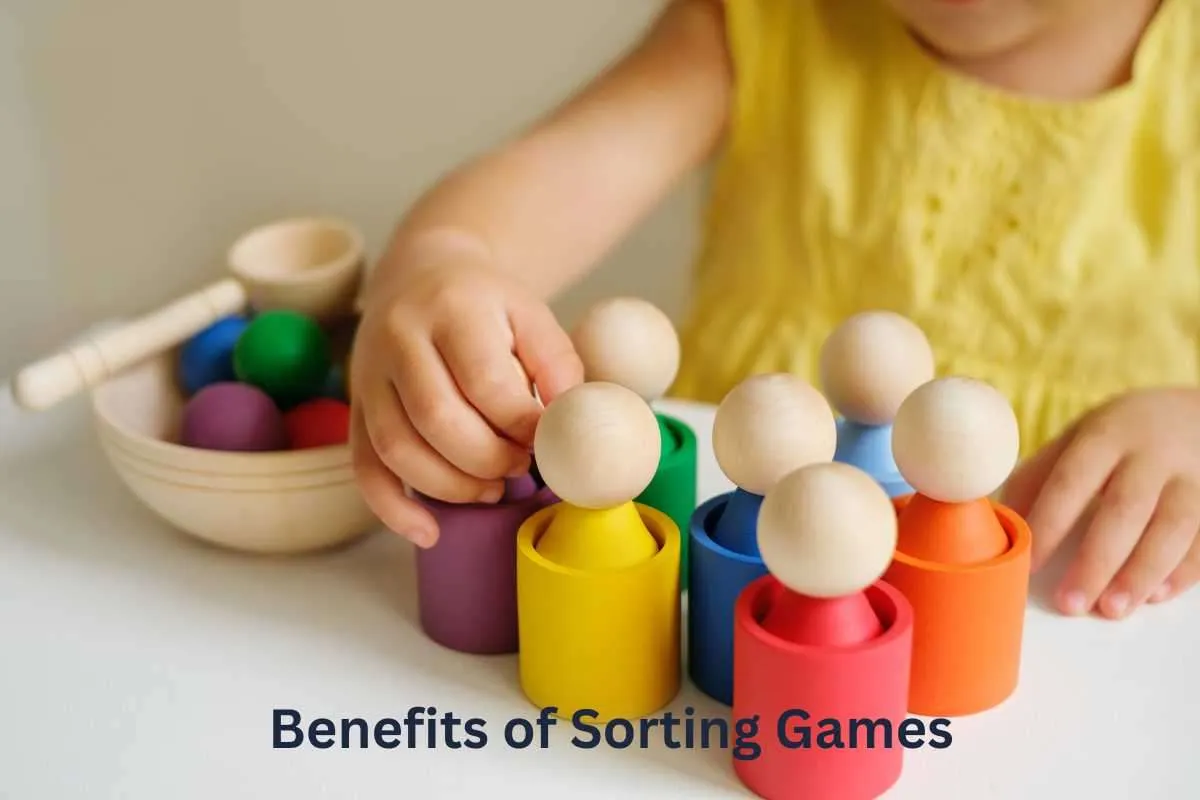In the vibrant world of toddler activities, sorting games stand out as both entertaining and immensely educational. These seemingly simple games, where objects are categorized based on color, shape, or size, lay the foundation for a myriad of cognitive and motor skills.
From enhancing fine motor coordination to fostering logical thinking and boosting attention to detail, sorting games play a pivotal role in early childhood development.
Journey with us as we delve into the benefits for toddlers of sorting games, shedding light on how these playful tasks shape young minds, preparing them for more complex challenges ahead.
Key Takeaways
| Benefit | Description |
|---|---|
| Cognitive Development | Sorting helps toddlers recognize patterns, similarities, and differences. |
| Problem Solving | Determining where an item belongs or how to categorize it fosters problem-solving skills. |
| Fine Motor Skills | Picking up and placing objects refines the small muscles in the hands and fingers. |
| Math Readiness | Introduces basic math concepts like classification, grouping, and counting. |
| Language Skills | Discussing categories or describing objects can enhance vocabulary and language comprehension. |
| Attention & Concentration | Sorting games require focus, helping to improve a toddler’s attention span. |
| Understanding of Categories | Toddlers begin to grasp the concept that things can be grouped based on certain attributes. |
| Sensory Development | Sorting games that involve different textures, sizes, or temperatures can stimulate the senses. |
| Hand-Eye Coordination | Matching an object to its correct spot requires coordination between vision and hand movement. |
| Persistence | Toddlers learn to keep trying until they get the sorting right, building perseverance. |
The Role of Sorting in Early Learning
Sorting games are an essential part of early learning for toddlers. Sorting helps children develop various cognitive and physical skills that are important for their growth and development. In this section, we will explore the role of sorting in early learning and how it can benefit your child.
Learning
Sorting games are an excellent way to introduce your child to new concepts. Sorting helps children learn about colors, shapes, and sizes. It also helps them understand the differences between objects and how they relate to each other. By sorting objects, children develop their ability to categorize and classify things, which is an important skill for learning.
Math
Sorting is a prerequisite for early mathematics. By sorting objects, children learn how to group things together based on similarities and differences. This skill is essential for understanding mathematical concepts such as addition, subtraction, and multiplication.
Sorting games also help children develop their counting skills, as they learn to count the number of objects in each group as well as using thinking skills to sort using two or more attributes, then children begin to develop matching skills during the sorting game.
Language
Sorting games are also great for encouraging language development. As children sort objects, they learn to describe them based on their characteristics, such as size, color, and shape. This helps them develop their vocabulary and language skills.
Sorting games also provide an opportunity for parents to engage with their child and have conversations about the objects they are sorting.
Logic and Thinking
Sorting games help children develop their logical and critical thinking skills. As they begin sorting
objects, many children learn to analyze and compare them based on their characteristics. This helps them develop their ability to reason and make decisions.
Sorting games also help children develop their problem-solving skills, as they learn to find solutions to sorting challenges.
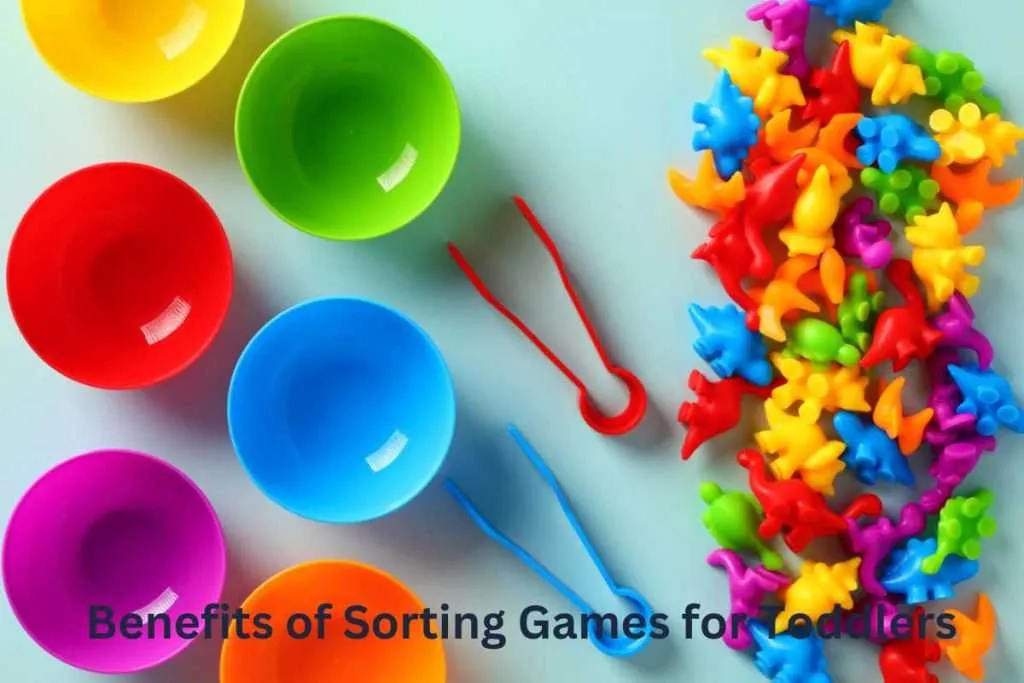
Benefits of Sorting Games for Toddlers
Sorting games can be a fun and engaging activity for toddlers, but did you know they also offer a wide range of benefits? Here are some of the ways sorting games can help your child develop important skills:
Cognitive Skills
Sorting games can help develop a range of cognitive skills, including critical thinking, problem-solving, and logical thinking. By sorting objects based on various characteristics, such as color, shape, size, or texture, toddlers are using their brains to categorize and group items together. This helps to develop their ability to compare, order, and graph information.
Math Skills
Sorting games are a great way to introduce toddlers to early math skills. By sorting objects based on different characteristics, toddlers are learning about numbers, patterns, and numeracy skills. Sorting games can also help with counting, matching, and grouping objects together.
Language Development
Sorting games can be a great way to encourage language development in toddlers. As they sort and categorize objects, they are learning new vocabulary words and practicing talking about the characteristics of objects. Sorting games can also help with organization and talking about different categories of objects.
Motor Skills
Sorting games with small objects can also help develop fine motor skills in toddlers. By manipulating and sorting objects, they are practicing their hand-eye coordination and developing their ability to use their hands and fingers in a precise way.
Sensory bins and hands-on activities, such as sorting counting bears or shape sorting, can also help with sensory development and motor skills.
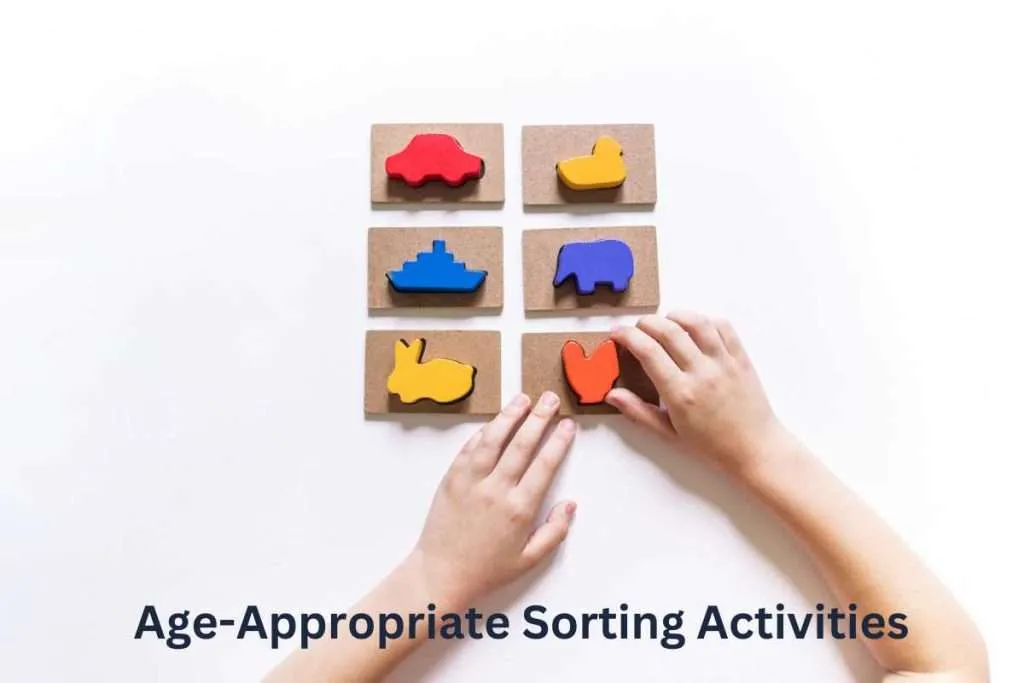
Age-Appropriate Sorting Activities
Sorting activities are not only fun for toddlers, but they can also help them develop important cognitive and physical skills. However, when it comes to sorting activities, it’s important to choose age-appropriate ones that match your child’s abilities and interests.
Here are some ideas for sorting activities for toddlers based on their age:
12-18 months
At this age, toddlers are just starting to develop their fine motor skills and hand-eye coordination. Simple sorting activities that involve large objects with contrasting colors or textures can be a great way to help them practice these skills. Here are some ideas:
- Sorting toys: Give your toddler a set of toys with different shapes or textures, such as blocks, balls, and stuffed animals, and encourage them into sorting animals by texture or color.
- Laundry sorting: Have your toddler help you sort laundry by color or texture. They can help you put all the red clothes in one pile and the blue clothes in another pile, for example.
- Drawer sorting: Give your toddler a drawer with a mix of different items, such as socks, bibs, and hats, and encourage them to sort them into piles based on their type.
18-24 months
At this age, toddlers are becoming more confident with their fine motor skills and hand-eye coordination. They may also start to show an interest in more complex sorting activities. Here are some ideas:
- Fruit sorting: Give your toddler a selection of different fruits, such as apples, oranges, and bananas, and encourage them to sort them by color or size.
- Book sorting: Give your toddler a pile of books and ask them to sort them by size or color. You can also encourage them to sort them by topic or author.
- Lego sorting: Give your toddler a pile of Legos and ask them to sort them by color or size. You can also encourage them to build something with the Legos once they’ve finished sorting them.
2-3 years
At this age, toddlers are becoming more independent and may start to show an interest in more challenging sorting activities. They may also be more interested in sorting activities that involve sound or movement. Here are some ideas:
- Leaf sorting: Take your toddler on a nature walk and collect different leaves. Encourage them to sort the leaves by color, shape, or texture.
- Rock sorting: Collect different rocks and encourage your toddler to sort them by size, shape, or texture. You can also encourage them to use the rocks to build something once they’ve finished sorting them.
- Bowl sorting: Give your toddler a set of bowls with different colors or patterns and encourage them to sort them by color or pattern. You can also encourage them to stack the bowls once they’ve finished sorting them.
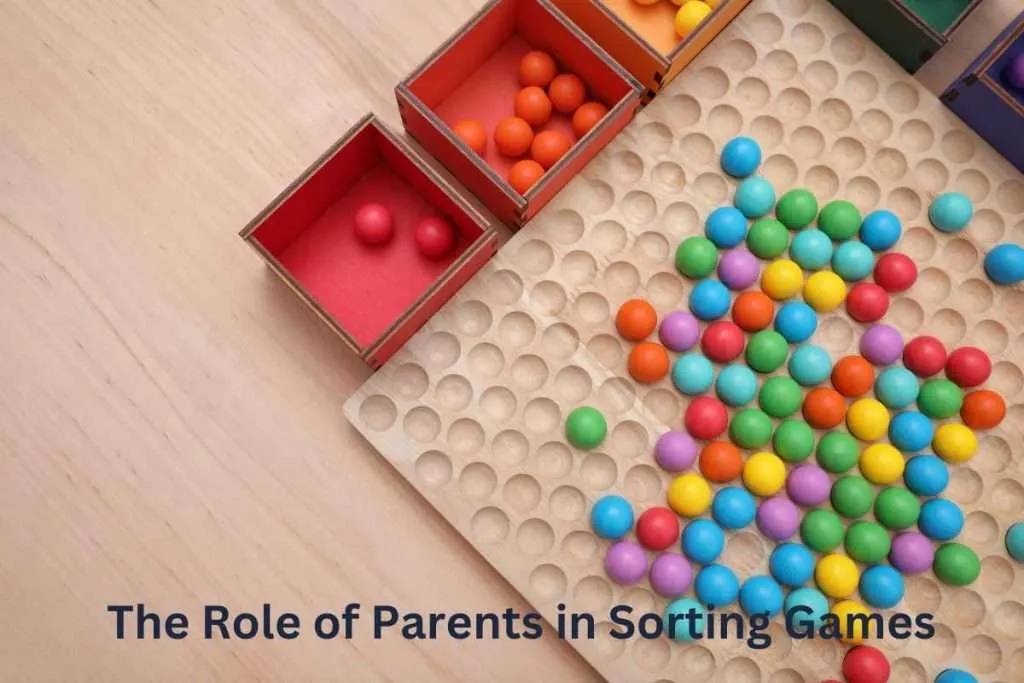
The Role of Parents and Teachers in Sorting Games
As a parent or teacher, you play a crucial role in helping your toddler develop their sorting skills. Here are some tips to help you make the most of sorting games:
Offer your toddler a variety of sorting games to keep them engaged and interested. You can use everyday objects such as toys, blocks, and utensils to create sorting games. You can also use sorting boards or trays that have different shapes and colors to make the games more challenging.
Let your toddler explore and experiment with the objects they are sorting. Encourage them to group the objects in different ways and to think about why they are grouping them that way. This will help them develop their critical thinking amd early literacy skills.
As your toddler is sorting, provide guidance and support as needed. Help them identify similarities and differences between objects and encourage them to use descriptive words to describe the objects they are sorting.
Incorporate sorting games into your daily routine. For example, you can have your toddler help you sort laundry by color or have them sort toys before putting them away. This will help them develop their organizational skills.
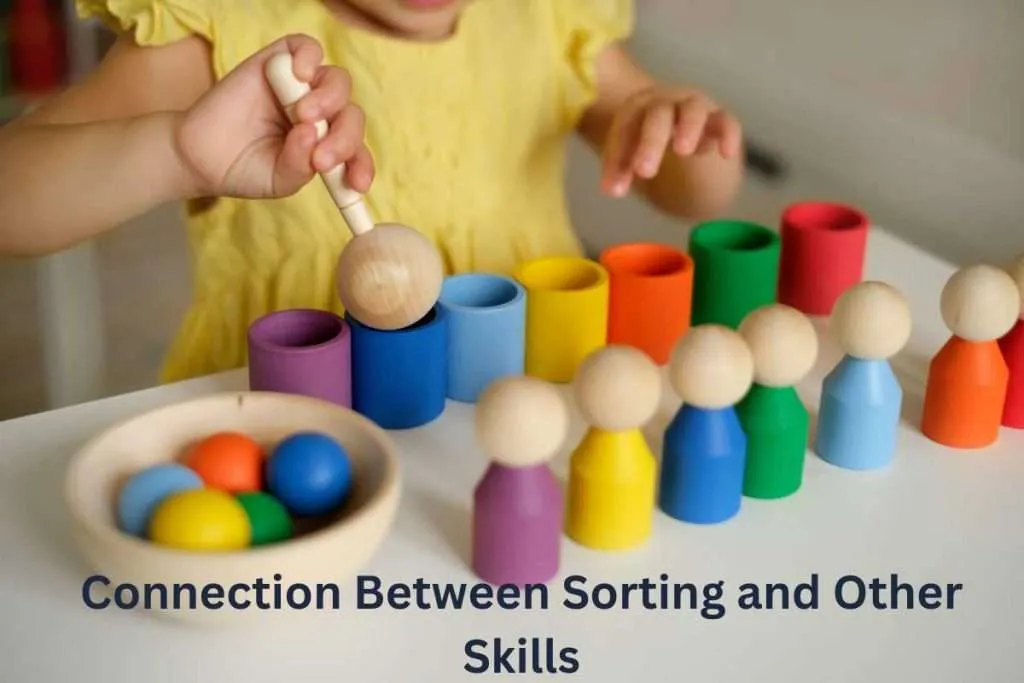
The Connection Between Sorting and Other Skills
Sorting games have multiple benefits for toddlers on cognitive and physical levels. Sorting activities help children develop a range of thinking skills and build the foundations for later problem-solving.
The visual memory and discernment involved, and the ability to identify patterns, relationships, similarities, and differences, assist children in learning about early number representation and problem-solving.
Sorting games are also a prerequisite for early mathematics. Sorting activities help children develop math skills, including counting, comparing, ordering, graphing, categorizing, and shape sorting. Sorting activities can also help children develop numeracy skills, including number sense and function.
Sorting and matching activities help develop visual perceptual skills, thinking, and memory skills. These important brain skills help with attention and problem-solving. Adding language sorting is also really great for encouraging language development.
Color sorting activities are also an excellent way to teach children about colors and color recognition. Color sorting activities help children develop color recognition skills, which are important for language development and cognitive development.
Sorting activities can also help children develop logical thinking and critical thinking skills. Sorting activities require children to categorize items based on their characteristics, which helps them develop logical thinking and problem-solving skills.
In addition to developing cognitive skills, sorting activities also help children develop fine motor skills and hand-eye coordination. Children can use their hands to manipulate objects, which helps develop their fine motor skills.
Frequently Asked Questions
What are the cognitive benefits of sorting games for toddlers?
Sorting games have multiple cognitive benefits for toddlers. They improve organizational skills, fine motor skills, and hand-eye coordination, and are a prerequisite for early mathematics. When toddlers sort objects, they learn to categorize them based on their similarities and differences. This helps them develop their problem-solving skills and improves their memory and concentration.
What are some sorting activities that can be done at home with toddlers?
There are many sorting activities that can be done at home with toddlers. You can start with simple activities such as sorting objects by color, shape, or size. You can also sort objects by texture, weight, or function. For example, you can have your toddler sort different types of fruits or vegetables, or sort toys by their purpose (e.g. cars, animals, blocks). You can also use everyday objects such as buttons, beads, or pasta to create sorting games.
How do matching and sorting activities help with a child’s development?
Matching and sorting activities help with a child’s development in many ways. They improve their visual perception, language skills, and cognitive abilities. When children match and sort objects, they learn to identify similarities and differences, and develop their ability to classify things based on their attributes. This helps them develop their problem-solving skills and improves their memory and concentration.
What are the benefits of learning sorting in early childhood education?
Learning sorting in early childhood education has many benefits. It helps children develop their cognitive abilities, problem-solving skills, and memory. It also helps them develop their language skills, as they learn to describe objects based on their attributes. Sorting is also an important prerequisite for early mathematics, as it helps children understand concepts such as counting, grouping, and patterns.
Why is sorting an important skill for toddlers to learn?
Sorting is an important skill for toddlers to learn because it helps them develop their cognitive abilities and problem-solving skills. It also helps them develop their language skills and improves their memory and concentration. Sorting is also an important prerequisite for early mathematics, as it helps children understand concepts such as counting, grouping, and patterns.
How can sorting games and activities be used to teach other skills to toddlers?
Sorting games and activities can be used to teach other skills to toddlers in many ways. For example, you can use sorting games to teach colors, shapes, and sizes. You can also use sorting games to teach vocabulary, as children learn to describe objects based on their attributes. Sorting games can also be used to teach math concepts such as counting, grouping, and patterns. Additionally, sorting games can be used to develop social skills, as children learn to work together and share materials.

